Bringing a dog into your family is a momentous decision, filled with the promise of fun, companionship, and unconditional love. Dogs quickly become cherished members of our households, bringing laughter, loyalty, and endless cuddles, not to mention the occasional dog hair.
However, the key to a harmonious home with a canine companion lies in selecting the right breed. This article will delve into the essential traits that define Excellent Family Dogs, focusing on breeds particularly well-suited for family life. We will explore the characteristics that make certain breeds stand out: patience with children, gentle dispositions, and trainability. These qualities are paramount in ensuring a dog seamlessly integrates into your home and becomes a beloved family pet for years to come.
Key Considerations When Choosing a Family Dog
Selecting an excellent family dog goes beyond just picking the cutest puppy. It requires careful consideration of your family’s lifestyle, activity levels, living space, and the level of commitment you’re prepared to offer. Understanding your family’s dynamics is crucial in determining if a dog will be a good fit. It’s vital to be realistic about the responsibility involved and choose a breed that aligns with your capacity to provide proper care.
When searching for the perfect canine addition to your family, prioritize breeds known for their tolerant and easygoing personalities. These dogs are generally better equipped to handle the energy and sometimes unpredictable nature of children. However, remember that even the most family-friendly dog breeds require consistent care and attention to thrive.
As you embark on the journey of becoming a pet parent, consider these vital factors when selecting a breed that will flourish within your family:
Temperament: The Cornerstone of a Family Dog
Temperament is arguably the most critical factor. An ideal family dog possesses a gentle, patient, and adaptable personality, capable of navigating the typical hustle and bustle of family life, including the occasional playful pokes and prods from children.
Breeds renowned as excellent family dogs, such as Labrador Retrievers and Poodles, are often celebrated for their calm and gentle nature, making them wonderful companions for households with children.
Size Matters: Finding the Right Fit
Size is another important consideration, especially when young children are part of the family. Small to medium-sized dogs are often considered the best family dogs, as they are less likely to accidentally overwhelm or injure a small child during play. However, size isn’t everything, and some larger breeds, with their gentle temperaments, can also be wonderful family pets.
Energy Levels: Matching Your Family’s Pace
A dog’s energy level must align with your family’s lifestyle. An energetic breed cooped up in a sedentary home can become unhappy and potentially exhibit behavioral issues due to frustration.
Assess your family’s activity level honestly. Can you or your children commit to providing adequate daily exercise for a high-energy breed? If your lifestyle is more relaxed, consider breeds with lower energy needs, such as a Bichon Frise, which are better suited to a more laid-back environment.
Hypoallergenic Considerations: For Allergy-Sensitive Families
If allergies are a concern within your family, exploring hypoallergenic breeds is a smart move. While no dog is completely allergen-free, certain breeds produce less dander and shed less, thus reducing the likelihood of triggering allergic reactions.
Excellent hypoallergenic dog breeds for families include Poodles, Bichon Frises, Kerry Blue Terriers, and Maltese. If possible, arrange for the family member with allergies to spend time with the prospective dog breed before bringing it home. This will help gauge potential allergic reactions and ensure a comfortable living situation for everyone.
Top Dog Breeds Ideal for Families
When it comes to choosing the best dog for your family, prioritize breeds known for their patient temperaments and energy levels that harmonize with your family’s daily life. Opting for child-friendly companions like Labrador Retrievers or Poodles, with their mellow and adaptable natures, can contribute to a joyful and harmonious home environment.
- Labrador Retriever
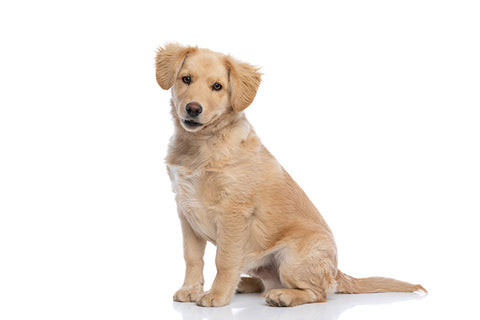 Labrador Retriever
Labrador Retriever
Labrador Retrievers are synonymous with family life, embracing the bustle and activity with unmatched enthusiasm. Their signature “ready to play” grin perfectly encapsulates their joyful spirit. Labs are consistently ranked among the most popular breeds, and for good reason – they are excellent family dogs.
Characteristics:
- Personality: Outgoing, patient, and relaxed, Labs are known for their friendly and adaptable nature.
- Energy: High energy levels mean they need plenty of exercise, making them ideal for active families.
- Good with Children: Absolutely! Their legendary patience makes them wonderful companions for children of all ages. However, adult supervision is always recommended when dogs and children interact.
- Good with Other Dogs: Yes, generally very sociable with other dogs.
- Shedding: Moderate shedding year-round, so regular cleaning is necessary.
- Grooming: Weekly brushing is usually sufficient, with more frequent brushing during shedding seasons.
- Bernese Mountain Dog
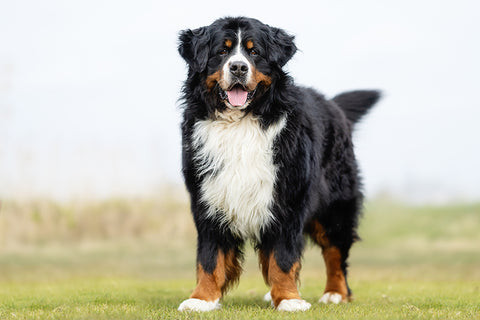 Bernese Mountain Dog
Bernese Mountain Dog
Bernese Mountain Dogs are gentle giants, known for their affectionate nature, loyal spirit, and surprising intelligence. Despite their large size, they are remarkably gentle and make wonderful family dogs, requiring moderate activity to stay happy and healthy.
Characteristics:
- Personality: Affectionate, gentle, and playful, Bernese Mountain Dogs thrive on family interaction.
- Energy Level: Needs a moderate level of activity, enjoying walks and playtime.
- Good with Children: Yes, they are known to be excellent with children, displaying patience and gentleness.
- Good with Other Dogs: Generally good with other dogs, especially with early socialization, but supervision is always advisable initially.
- Shedding: Regular shedding, particularly during shedding season, requires consistent grooming.
- Grooming: Weekly brushing is essential to manage their thick coat and minimize shedding.
- Poodle
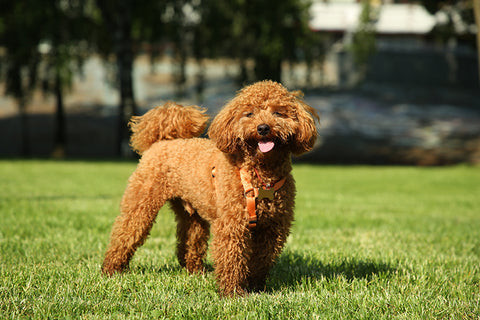 Poodle
Poodle
Poodles, in all their sizes (Standard, Miniature, and Toy), are intelligent, energetic, and eager to please, making them highly trainable and adaptable family pets. Their playful and sometimes silly nature endears them to children and adults alike. Notably, Poodles are often recommended as one of the best dog breeds for allergy sufferers due to their minimal shedding.
Characteristics:
- Personality: Trainable, proud, and highly intelligent, Poodles excel in various dog sports and activities.
- Energy Level: High energy levels, especially for Standard Poodles, requiring significant daily exercise.
- Good with Children: Yes, Poodles are generally good with children, known for their gentle and playful interactions.
- Good with Other Dogs: Socialization is key; with proper introduction, they can be good with other dogs, but supervision is recommended initially.
- Shedding: Minimal shedding, making them a good choice for allergy-sensitive families.
- Grooming: Daily brushing is necessary to prevent matting in their curly coats, and regular professional clipping is required.
- Beagle
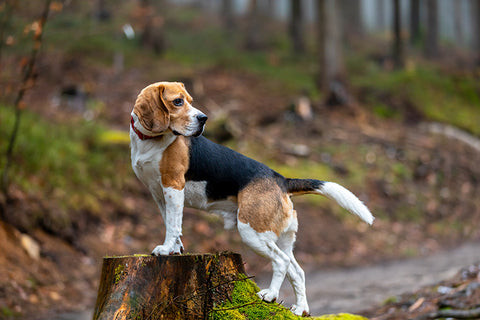 beagle
beagle
Beagles possess an irresistible charm that few can resist. As solid family companions, Beagles are adaptable, ready to play energetically or cuddle gently, depending on the family’s mood. Their friendly and curious nature makes them engaging members of any household.
Characteristics:
- Personality: Sweet, gentle, and upbeat, Beagles have a cheerful disposition that brings joy to families.
- Energy Level: Moderate energy level, requiring daily walks and playtime to stay content.
- Good with Children: Yes, Beagles are known to be good with children, enjoying their playful energy.
- Good with Other Dogs: Generally good with other dogs, especially with early socialization to curb their hunting instincts.
- Shedding: Moderate year-round shedding, requiring regular cleaning.
- Grooming: Weekly brushing is sufficient to manage their short coat.
- Golden Retriever
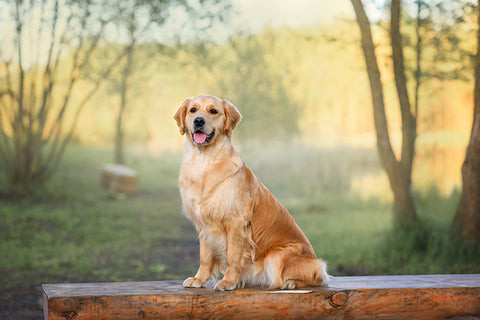 golden retriever
golden retriever
Finding a breed more fun-loving than a Golden Retriever is a challenge. Goldens are perpetually cheerful, enthusiastically participating in whatever games and activities children dream up. Their boundless energy and affectionate nature make them excellent family dogs, particularly for active households seeking a tireless playmate.
Characteristics:
- Personality: Affectionate, trusting, and devoted, Golden Retrievers are eager to please and love being part of the family.
- Energy: Very active breed requiring substantial daily exercise to manage their energy levels.
- Good with Kids: Excellent! Golden Retrievers are renowned for their exceptional patience and love for children.
- Good with Other Dogs: Yes, generally excellent with other dogs, especially when socialized early; supervision is still recommended during initial interactions.
- Shedding: Constant moderate to heavy shedding, requiring frequent cleaning.
- Grooming: Daily brushing is necessary to manage their thick coat and shedding, along with frequent vacuuming of the home.
- Bichon Frise
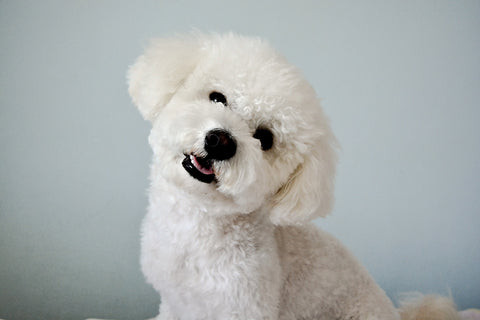 Bichon Frise
Bichon Frise
Bichon Frises, with their fluffy white coats and cheerful personalities, bring delight and cheer to any home. Their irresistible charm and playful nature make them popular family dogs. They are also considered hypoallergenic, adding to their appeal for families with allergies. Bichons thrive on interaction and adore the laughter of children.
Characteristics:
- Personality: Playful, cheerful, and perky, Bichons are always ready for fun and games.
- Energy: Moderate energy level, needing daily walks and playtime to stay happy.
- Good with Kids: Excellent, Bichons are known for their gentle and playful interactions with children.
- Good with Other Dogs: Yes, generally great with other dogs, especially when supervised, enjoying canine companionship.
- Shedding: Minimal shedding and considered hypoallergenic, making them a good choice for allergy sufferers.
- Grooming: Daily brushing is essential to maintain their fluffy coat and prevent matting, along with regular professional haircuts.
- Collie
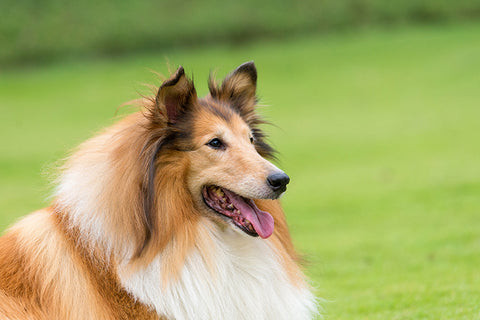 Collie
Collie
Collies, originating from herding backgrounds, develop intense bonds with their families, considering them their “flock.” They become gentle and vigilant guardians, active and energetic outdoors, yet composed and calm indoors. Collies require consistent mental and physical stimulation to satisfy their intelligent and active minds.
Characteristics:
- Personality: Loyal, responsive, and protective, Collies are deeply devoted to their families.
- Energy: Very high energy level, needing significant daily exercise and mental challenges.
- Good with Kids: Yes, generally good with children, but supervision is recommended, particularly with very young children, due to their herding instincts.
- Good with Other Dogs: Yes, but early socialization is crucial to ensure they interact well with other dogs.
- Shedding: Twice yearly heavy shedding during shedding seasons.
- Grooming: Daily brushing is required during shedding months to manage their thick coat and shedding.
- Newfoundland
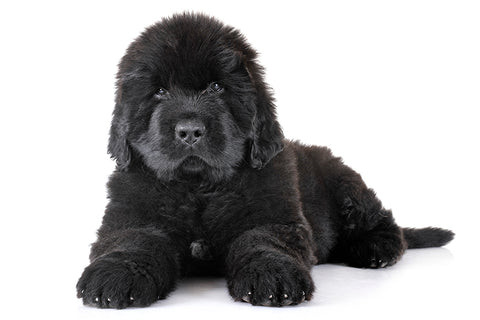 Newfoundland
Newfoundland
Newfoundlands are massive yet mild-mannered dogs, their imposing size belying their remarkably sweet and gentle temperament. They move with surprising grace indoors and patiently tolerate the often clumsy antics of children. Newfoundlands are known for their protective nature and love for their families.
Characteristics:
- Personality: Calm, generous, and obedient, Newfoundlands are known for their gentle and patient nature.
- Energy Level: Moderate energy level, needing regular walks to maintain their health.
- Good with Children: Excellent, Newfoundlands are often called “nanny dogs” due to their gentle and protective nature towards children.
- Good with Other Dogs: Yes, generally good with other dogs, but supervision is recommended to ensure safe interactions due to their size.
- Shedding: Heavy year-round shedding, requiring consistent cleaning efforts.
- Grooming: Weekly brushing is essential to manage their thick coat and shedding.
- Border Collie
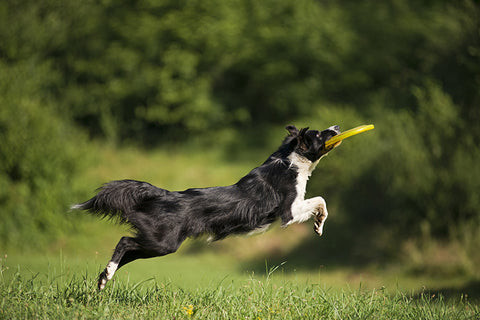 border collie
border collie
Border Collies are renowned as one of the cleverest dog breeds, celebrated for their intelligence and trainability. They require intense daily mental and physical stimulation to prevent boredom and channel their energy constructively. Border Collies thrive in active families who can provide them with ample activities.
Characteristics:
- Personality: Energetic, smart, and intense, Border Collies are highly driven and intelligent dogs.
- Energy Level: Very high energy level, demanding significant daily exercise and mental challenges.
- Good with Children: Excellent with supervision, Border Collies can be wonderful family dogs, but their herding instincts might require management around children.
- Good with Other Dogs: Yes, with early socialization, Border Collies can coexist well with other dogs.
- Shedding: Seasonal moderate shedding.
- Grooming: Weekly brushing is usually sufficient to manage their coat.
- Boxer
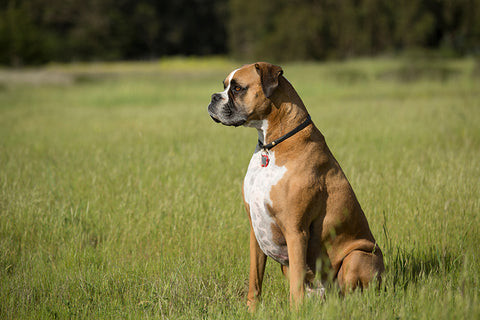 Boxer
Boxer
For families seeking a protective yet silly and fun-loving companion, Boxers are an excellent choice. Their patience, gentleness, and playful swagger make Boxers ideal for active households. They are known for their loyalty and affectionate nature towards their families.
Characteristics:
- Personality: Fun-loving, bright, and active, Boxers are always up for games and adventures.
- Energy Level: Very high energy level, requiring substantial daily exercise and playtime.
- Good with Children: Excellent, Boxers are known for their playful and gentle interactions with children.
- Good with Other Dogs: Requires socialization from a young age to ensure they get along well with other dogs.
- Shedding: Moderate year-round shedding.
- Grooming: Weekly brushing is typically sufficient to maintain their short coat.
- Shih Tzu
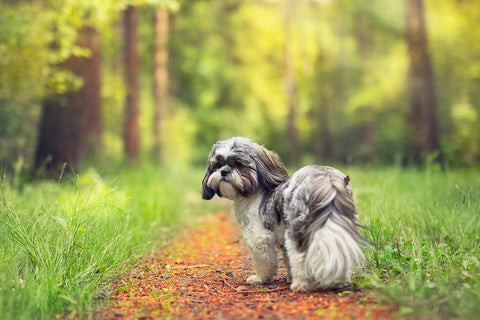 Shih Tzu
Shih Tzu
Shih Tzus are easygoing, affectionate, and trusting, making them wonderful companions for various lifestyles. They are cuddly yet adaptable, suited to both active and more relaxed households due to their moderate exercise needs. Shih Tzus thrive on companionship and are known for their charming personalities.
Characteristics:
- Personality: Friendly and bright, Shih Tzus are known for their happy and sociable nature.
- Energy Level: Moderate energy level, needing regular short walks and playtime.
- Good with Children: Excellent, Shih Tzus are generally gentle and enjoy the company of children.
- Good with Other Dogs: Yes, Shih Tzus typically get along well with other dogs.
- Shedding: Moderate shedding.
- Grooming: Regular brushing is required to maintain their long coat and prevent matting.
- Welsh Corgi (Pembroke or Cardigan)
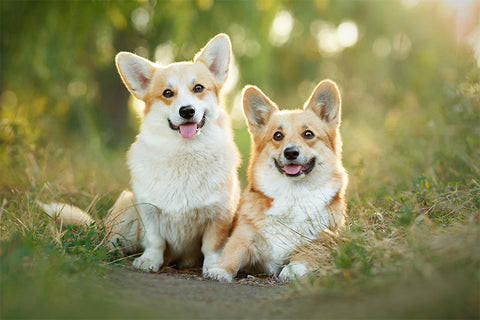 Welsh Corgi
Welsh Corgi
Originally bred to herd cattle, Welsh Corgis retain their spunky boldness and intelligence. They engage in amusing play sessions with respectful children and thrive when included in family activities. Corgis are known for their loyalty and adaptable nature.
Characteristics:
- Personality: Bold, smart, and vocal, Corgis are known for their confident and intelligent personalities.
- Energy Level: Moderate energy level, needing daily exercise and mental stimulation.
- Good with Children: Good with supervision, Corgis can be good with older children who understand how to interact respectfully with dogs; supervision is recommended with younger children due to their herding instincts.
- Good with Other Dogs: Requires socialization to ensure they get along well with other dogs.
- Shedding: Heavy year-round shedding.
- Grooming: Regular brushing is necessary to manage their shedding.
- Irish Setter
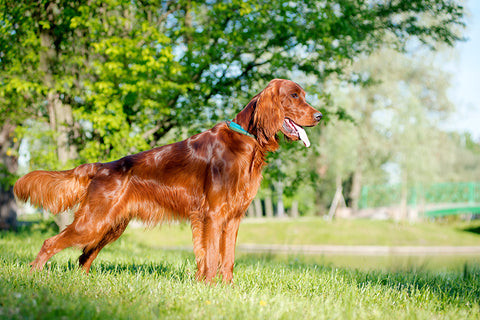 Irish Setter
Irish Setter
Irish Setters are active and fun-loving companions, always alert and enthusiastic. Their playful and affectionate nature makes them wonderful family dogs for active households. Irish Setters thrive on exercise and human interaction.
Characteristics:
- Personality: Rambunctious, clownish, and demonstrative, Irish Setters are full of energy and affection.
- Energy Level: High energy level, requiring significant daily exercise to manage their energy.
- Good with Children: Good with supervision, Irish Setters can be great with children, but their high energy might be overwhelming for very young children; supervision is recommended.
- Good with Other Dogs: Yes, Irish Setters generally get along well with other dogs.
- Shedding: Significant year-round shedding.
- Grooming: Thrice weekly brushing is needed to manage their coat and shedding.
- Vizsla
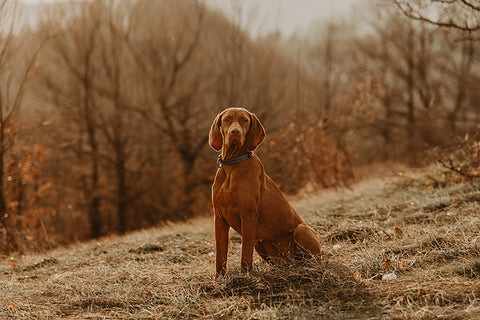 Vizsla
Vizsla
Vizslas stand out with their striking appearance and sleek coats. Their lack of an undercoat minimizes shedding concerns, making them ideal family pets for active children and allergy-conscious homes. Vizslas are known for their affectionate nature and high energy levels.
Characteristics:
- Personality: Gentle and energetic, Vizslas are known for their affectionate and Velcro-like attachment to their families.
- Energy Level: High energy level, requiring substantial daily exercise to stay happy and healthy.
- Good with Children: Yes, with supervision, Vizslas are generally good with children, but their high energy might be overwhelming for very young children.
- Good with Other Dogs: Yes, but under supervision, Vizslas can get along with other dogs, but early socialization and supervised introductions are recommended.
- Shedding: Low shedding due to their lack of undercoat.
- Grooming: Weekly brushing is typically sufficient to maintain their coat.
- Samoyed
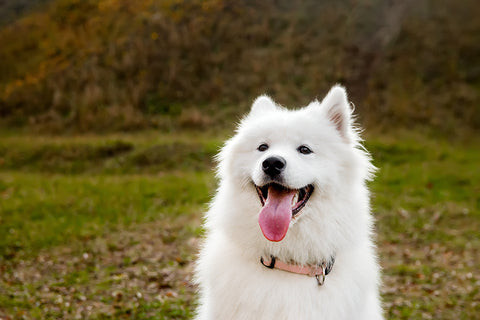 Samoyed
Samoyed
Samoyeds are known for their distinctive “Sammy smile,” which perfectly reflects their amiable and friendly temperament. They adapt effortlessly to family routines and are remarkably loyal companions. Samoyeds thrive on companionship and enjoy being part of family activities.
Characteristics:
- Personality: Friendly and gentle, Samoyeds are known for their affectionate and sociable nature.
- Energy Level: High energy level, needing daily exercise to manage their energy and stay healthy.
- Good with Children: Yes, but may need supervision, Samoyeds are generally good with children, but supervision is recommended, especially with very young children, due to their size and energy.
- Good with Other Dogs: Yes, Samoyeds typically get along well with other dogs.
- Shedding: High shedding, particularly during shedding seasons, requiring consistent cleaning.
- Grooming: Brushing twice a week is essential to manage their thick coat and shedding.
The Friendliest Dog Breeds for Families
While most well-socialized dogs can become wonderful family companions, some breeds are particularly known for their outgoing and trusting nature, especially towards unfamiliar people. Breeds like Golden Retrievers and Irish Setters often top the list of friendliest dogs.
-
Labrador Retriever: It’s no surprise that Labrador Retrievers consistently rank as one of the most popular dog breeds. Their eagerness to please, coupled with their loving nature towards people and other animals, makes them exceptionally friendly. Their patience, gentle demeanor, and overall friendliness solidify their position as one of the friendliest and best family dog breeds.
-
Golden Retriever: Sharing a similar temperament with Labrador Retrievers, Golden Retrievers are equally friendly and tolerant. They make friends easily and are generally happy dogs, radiating positivity wherever they go. Their joyful and approachable nature makes them universally loved.
-
Cavalier King Charles Spaniel: Few can resist the charm of a Cavalier King Charles Spaniel. Their mild-mannered and gentle nature makes them wonderful companions for everyone, from small children to older adults. Their adaptability and affectionate personalities make them ideal family pets.
-
Irish Setter: Beneath their elegant red coat lies an incredibly outgoing and warm heart. Irish Setters eagerly befriend new people with enthusiastic greetings. However, their high energy levels necessitate adequate exercise to prevent mischief stemming from boredom.
-
Mixed Breed Dogs: The temperament of mixed-breed dogs can vary greatly depending on their lineage. However, many mixed breeds inherit the friendly traits of family-oriented breeds like Labradors or Retrievers, making them wonderful and often resilient family pets. Exploring adoption options at local shelters can be a rewarding way to find an excellent mixed-breed family dog.
Low-Maintenance Family Dogs: Practical Choices for Busy Families
For families seeking a more low-maintenance canine companion, certain breeds are better suited than others. Generally, small to medium-sized breeds with moderate energy levels and easy-to-manage grooming needs are ideal. While “low-maintenance” doesn’t mean no maintenance, these breeds require less intensive care, fitting well into busy lifestyles.
Breeds like Beagles, Bichon Frises, and Labrador Retrievers (despite their energy needs, their grooming is relatively simple) can be considered lower maintenance in terms of grooming and exercise demands compared to some other breeds. However, all dogs require regular walks, playtime, and attention to thrive.
Most low-maintenance family dogs still need regular short walks and playtime to stay happy and healthy. They are often content to lounge around the house with their families, balancing activity with periods of rest. Choosing a breed with a less demanding coat, like a Beagle or Vizsla, can also simplify grooming routines for busy families.
Essential Tips for Caring for Your Family Dog
Bringing a dog into your family is a rewarding experience, but it also comes with responsibilities. Providing proper care ensures your dog’s health, happiness, and successful integration into your family.
-
Create a Clean and Safe Home Environment: Dog-proof your home by scanning for potential hazards at your dog’s eye level. Secure loose wires, put away toxic substances, and remove small objects that could be choking hazards. Ensure fences are secure and repair any potential escape routes. Supervise playtimes, especially with children, to ensure gentle interactions.
-
Establish a Consistent Daily Routine: Dogs thrive on routine. Set a consistent schedule for feeding, walks, playtime, and even rest. Consistency aids in training and helps establish good behavior as your dog learns what to expect each day. Maintaining a regular feeding schedule and diet, such as using a quality dog food like James Wellbeloved™ Dog Food, minimizes digestive upsets and contributes to overall health.
-
Prioritize Veterinary Care: Regular veterinary check-ups are crucial for maintaining your dog’s health. Keep vaccinations up-to-date and administer preventative treatments for fleas, ticks, and worms as recommended by your vet. Follow your veterinarian’s advice on diet and exercise to meet your dog’s specific needs and ensure a long and healthy life.
-
Involve Children in Dog Care (Under Supervision): Teach children how to interact respectfully and gently with the dog. Show them how to stroke the dog gently, offer treats as rewards during training, and avoid rough play. Involve them in simple care tasks like filling water bowls, always under adult supervision to ensure the safety and well-being of both child and dog.
-
Ensure Proper Diet and Exercise: Provide your dog with adequate mental and physical stimulation daily. Follow your veterinarian’s feeding guidelines to provide appropriate nutrition for their breed, age, and activity level. Choose high-quality dog food and avoid giving unhealthy table scraps. Regular exercise is vital for their physical and mental health, preventing boredom and promoting a healthy weight. Be aware of dog home safety tips to further ensure a secure environment for your canine companion.
Conclusion: Finding Your Perfect Family Dog
Adding a dog to your family is a significant decision that requires thoughtful consideration. Carefully evaluating breed traits and individual temperaments, and matching them to your family’s lifestyle and capabilities, is essential for a successful and joyful partnership.
The effort invested in choosing the right dog pays off immeasurably. Finding that perfect furry friend brings infinite rewards, filling your home with love, laughter, and years of cherished memories.
Consider joining a Puppy Club for valuable resources and discounts as you welcome a new puppy into your family. These clubs often provide expert nutritional advice and helpful tips to support your puppy’s crucial first year, setting the foundation for a long and happy life together.


